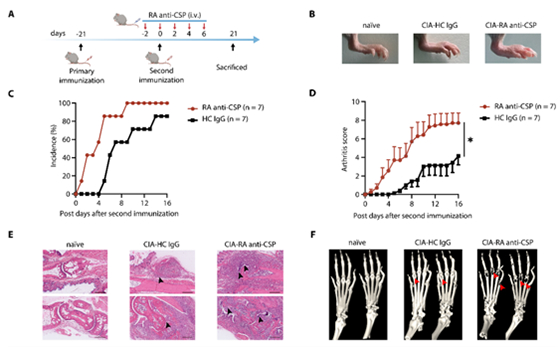

Anti CSP can significantly exacerbate the onset of experimental arthritis
in mice
With the support of the National Natural Science Foundation of China's
"Digital Decoding of Immunity" major research project (approval number:
92374202), the team led by Professor Li Zhanguo and Professor Hu Fanlei from the
Institute of Rheumatology and Immunology at Peking University People's Hospital
has made progress in the research of new biomarkers for rheumatoid arthritis.
The research findings, titled "Large scale multicenter study reveals anti
citrullinated SR-A peptide antibody as a biomarker and examiner for rheumatoid
arthritis", were published on January 3, 2025 in the journal Science Advances.
The link to the paper is: https://www.science.org/doi/10.1126/sciadv.adr8078
.
Rheumatoid arthritis (RA) is one of the most common highly disabling
autoimmune diseases in clinical practice, with over 30 million patients
worldwide. Its diagnosis mainly relies on the detection of serum rheumatoid
factor (RF) and anti cyclic citrullinated peptide antibodies (anti CCP).
However, over one-third of patients still have negative RF and anti CCP, lack
effective biomarkers, make clinical diagnosis difficult, leading to delayed
treatment and disability. This study found through large-scale multicenter
clinical trials that anti citrullinated scavenger receptor A peptide antibodies
(anti CSP) can serve as a novel diagnostic biomarker for RA, particularly
suitable for serum negative and early RA diagnosis. In addition, the research
team discovered abnormal glycosylation patterns of anti CSP in RA patients and
used in vivo and in vitro functional studies to reveal its pro-inflammatory
effects, providing a new perspective for the study of RA pathological
mechanisms. This study provides new biomarkers and targets for the diagnosis and
treatment of RA.